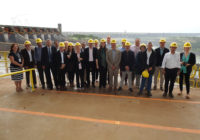
The fourth session of the Initiatives for the Future of Great Rivers (IFGR) met at the Itaipu Binacional dam shared between Paraguay and Brazil in March 2017. The topic was "Hydropower: Tensions and Perspectives". Our fellow James Spalding, the Paraguayan Director of the plant, and his colleagues were fantastic hosts and made this convention a remarkable success.
Mega-dams such as Itaipu are seen increasingly critical, not only in Latin America. The largest unused reserves of the planet's hydropower are located in the Global South tough. The tensions that the ongoing expansion of renewable hydro electricity therefore brings should lead toward a technological paradigm-shift instead of rising violence between the parties. It was impressive to learn how much the operation of itaipu contributes to both the peace between the two countries running that place and to the development of both economies. This dam not only supplies 100% of Paraguay's and 18% of Brazil's energy, but also it has been instigating a boost in education and general development of the region. The efforts of ecological projects around the reservoir are impressive. Regarding the existing dam the IFGR learned how to grow the benefits in a meaningful way for both the people and the environment.
This, however, prompts the question, whether mega-dams will be the future of hydropower? Today Itaipu is by size the world's second largest and by performance the largest plant. But in a decade even bigger structures, currently under construction, will surpass it. Bernd's insight is that with the change in the power distribution from large central national companies to decentralised local grids on the way, mega structures will become increasingly less attractive in favour of emerging smaller and softer means of generation. Currently we see the rise of in-stream turbines for the "small hydropower", which development complements micro-grids owned and run by river communities themselves. This trend seems to promise a more attentive extension of renewable hydro electricity.
Bernd and the IFGR are preparing new research projects to explore and forge new ways towards a more human-scaled power-generation that is much easier on the environment as well. This will be an important effort of the IFGR in the time coming; stay tuned.
